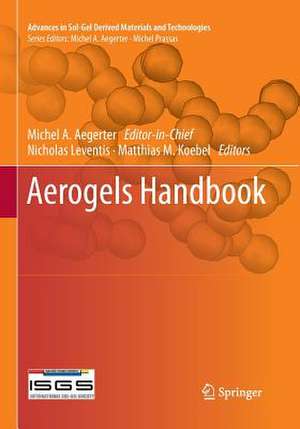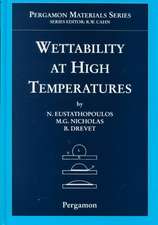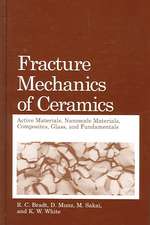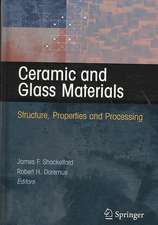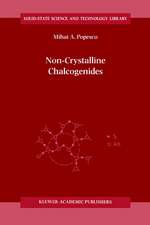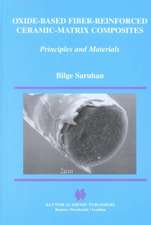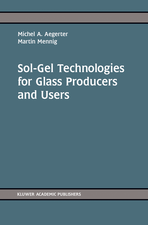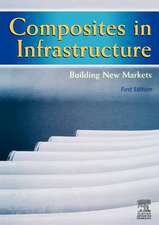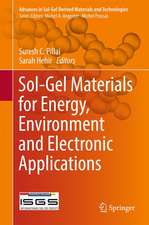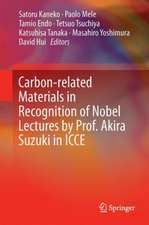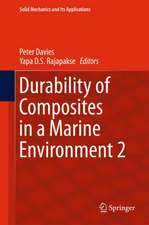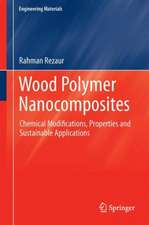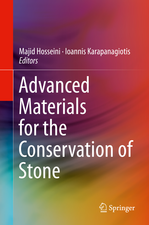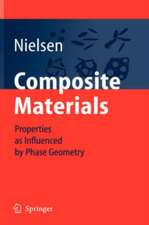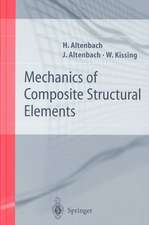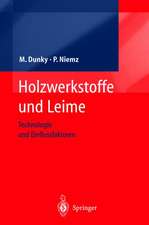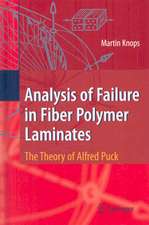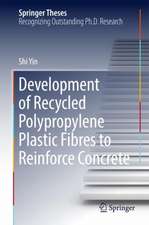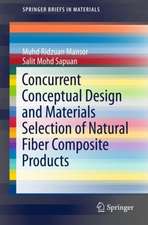Aerogels Handbook: Advances in Sol-Gel Derived Materials and Technologies
Editat de Michel Andre Aegerter, Nicholas Leventis, Matthias M. Koebelen Limba Engleză Paperback – 23 aug 2016
| Toate formatele și edițiile | Preț | Express |
|---|---|---|
| Paperback (1) | 2512.06 lei 6-8 săpt. | |
| Springer – 23 aug 2016 | 2512.06 lei 6-8 săpt. | |
| Hardback (1) | 2473.65 lei 6-8 săpt. | |
| Springer – iul 2011 | 2473.65 lei 6-8 săpt. |
Preț: 2512.06 lei
Preț vechi: 3063.49 lei
-18% Nou
Puncte Express: 3768
Preț estimativ în valută:
480.67€ • 501.86$ • 397.82£
480.67€ • 501.86$ • 397.82£
Carte tipărită la comandă
Livrare economică 04-18 aprilie
Preluare comenzi: 021 569.72.76
Specificații
ISBN-13: 9781493951031
ISBN-10: 1493951033
Pagini: 932
Ilustrații: XXXI, 932 p.
Dimensiuni: 178 x 254 mm
Greutate: 1.65 kg
Ediția:Softcover reprint of the original 1st ed. 2011
Editura: Springer
Colecția Springer
Seria Advances in Sol-Gel Derived Materials and Technologies
Locul publicării:New York, NY, United States
ISBN-10: 1493951033
Pagini: 932
Ilustrații: XXXI, 932 p.
Dimensiuni: 178 x 254 mm
Greutate: 1.65 kg
Ediția:Softcover reprint of the original 1st ed. 2011
Editura: Springer
Colecția Springer
Seria Advances in Sol-Gel Derived Materials and Technologies
Locul publicării:New York, NY, United States
Cuprins
HISTORY of AEROGELS
MATERIALS and PROCESSING
Inorganic—silica based aerogels: Review of SiO2 aerogels - Hydrophobic - Superhydrophobic - Flexible aerogels - Sodium silicate
Inorganic—non silicate aerogels: ZrO2 aerogels - TiO2 aerogels - Use of epoxides for various single and mixed metal oxides aerogels
Organic—natural and synthetic aerogels: Monoliths and fibrous cellulose aerogels - Cellulosic and polyurethane - Resorcinol-formaldehyde - Natural aerogels for C-sequestration and pesticides trapping
Composite aerogels: Polymer crosslinked aerogels - Interpenetrating organic/inorganic aerogels networks - Polymer reinforced aerogels - Aerogels containing metal, alloy and oxide nanoparticles
Exotic aerogels: Chalcogenide aerogels - Chitosan silica hybrid aerogels - Anisotropic aerogels - Sonogels
PROPERTIES (including characterization and testing methods)
Structural properties and characterization
Mechanical characterization
Thermal properties
Simulation and modeling
APPLICATIONS AND USES
Energy: Nanostructured energetic aerogels and nanocomposites – Superinsulation with aerogels
Chemistry and Physics: Chemical Sensors -High energy physics - Nuclear waste containment
Biomedical and pharmaceutical applications with aerogels
Space and airborne: Space exploration- Ultrasonic transducers
Metal industry: Foundry
Art: Sculptures
COMMERCIAL PRODUCTS
Manufacturing and marketing – Nanogels by Cabot Corporation – Organic aerogels by American Aerogel Corporation – Thermal insulation with Nano Hi-tech aerogels – Thermal insulation daylighting by OKAGEL
MATERIALS and PROCESSING
Inorganic—silica based aerogels: Review of SiO2 aerogels - Hydrophobic - Superhydrophobic - Flexible aerogels - Sodium silicate
Inorganic—non silicate aerogels: ZrO2 aerogels - TiO2 aerogels - Use of epoxides for various single and mixed metal oxides aerogels
Organic—natural and synthetic aerogels: Monoliths and fibrous cellulose aerogels - Cellulosic and polyurethane - Resorcinol-formaldehyde - Natural aerogels for C-sequestration and pesticides trapping
Composite aerogels: Polymer crosslinked aerogels - Interpenetrating organic/inorganic aerogels networks - Polymer reinforced aerogels - Aerogels containing metal, alloy and oxide nanoparticles
Exotic aerogels: Chalcogenide aerogels - Chitosan silica hybrid aerogels - Anisotropic aerogels - Sonogels
PROPERTIES (including characterization and testing methods)
Structural properties and characterization
Mechanical characterization
Thermal properties
Simulation and modeling
APPLICATIONS AND USES
Energy: Nanostructured energetic aerogels and nanocomposites – Superinsulation with aerogels
Chemistry and Physics: Chemical Sensors -High energy physics - Nuclear waste containment
Biomedical and pharmaceutical applications with aerogels
Space and airborne: Space exploration- Ultrasonic transducers
Metal industry: Foundry
Art: Sculptures
COMMERCIAL PRODUCTS
Manufacturing and marketing – Nanogels by Cabot Corporation – Organic aerogels by American Aerogel Corporation – Thermal insulation with Nano Hi-tech aerogels – Thermal insulation daylighting by OKAGEL
Notă biografică
Prof. Dr. Michel A. Aegerter graduated as Engineer and Physicist in 1962 at the Swiss Institute of Technology- EPFL, Switzerland and received his Ph.D degree (Dr. ès Sciences) in 1966 at the University of Neuchâtel, Switzerland. After post-doctoral studies at the University of Utah, Salt Lake City,USA, he joined again the University of Neuchâtel as assistant professor and then the University of Sao Paulo, Sao Carlos, Brazil as a full Professor till 1995 where he initiated research in the sol-gel field in 1984 with the collaboration of Prof. Dr. J. Zarzycki. In 1995 he accepted an invitation to be Director of the Department of Coating Technology at the Leibniz-Institute for New Materials gem. GmbH- INM in Saarbruecken, Germany, a position that he still hold. He is also Honorary Professor at the University of Saarland, Saarbruecken (Germany). He is the present Chairman of the Technical Committee TC-16 (Sol-Gel Glasses) of the International Commission on Glass (ICG), member of the American Ceramic Society, Material Research Society, SPIE, of several International Advisory Committees, of the Editorial Board of the International J. of Photochemistry, co-editor for Europe of the J. Sol-Gel Science and Technology, editorial Chairman of the International Conference on Coatings on Glass-ICCG as well as referee for several international scientific journals. His present fields of activity covers the research and industrial development of functional, conducting, photoelectrochemical and electrochromic coatings on glasses and plastics, the development of new sol-gel and nanocomposite coating technology. Prof. Dr. Aegerter is the author and co-author of more than 440 scientific publications, 8 patents and co-editor of 12 books.
Textul de pe ultima copertă
Aerogels are the lightest solids known. Up to 1000 times lighter than glass and with a density as low as only four times that of air, they show very high thermal, electrical and acoustic insulation values and hold many entries in Guinness World Records. Originally based on silica, R&D efforts have extended this class of materials to non-silicate inorganic oxides, natural and synthetic organic polymers, carbon, metal and ceramic materials, etc. Composite systems involving polymer-crosslinked aerogels and interpenetrating hybrid networks have been developed and exhibit remarkable mechanical strength and flexibility. Even more exotic aerogels based on clays, chalcogenides, phosphides, quantum dots, and biopolymers such as chitosan are opening new applications for the construction, transportation, energy, defense and healthcare industries. Applications in electronics, chemistry, mechanics, engineering, energy production and storage, sensors, medicine, nanotechnology, military and aerospace, oil and gas recovery, thermal insulation and household uses are being developed with an estimated annual market growth rate of around 70% until 2015.The Aerogels Handbook summarizes state-of-the-art developments and processing of inorganic, organic, and composite aerogels, including the most important methods of synthesis, characterization as well as their typical applications and their possible market impact. Readers will find an exhaustive overview of all aerogel materials known today, their fabrication, upscaling aspects, physical and chemical properties, and most recent advances towards applications and commercial products, some of which are commercially available today. Key Features: •Edited and written by recognized worldwide leaders in the field•Appeals to a broad audience of materials scientists, chemists, and engineers in academic research and industrial R&D•Covers inorganic, organic, and composite aerogels•Describes military, aerospace, building industry,household, environmental, energy, and biomedical applications among others
Caracteristici
Chapters written by recognized worldwide leaders in the field Appeals to a broad audience of materials scientists, chemists, and engineers in academia and industrial R&D Covers inorganic, organic, and composite aerogels Describes military, aerospace, household, environmental, energy, and biomedical applications among others Includes supplementary material: sn.pub/extras
